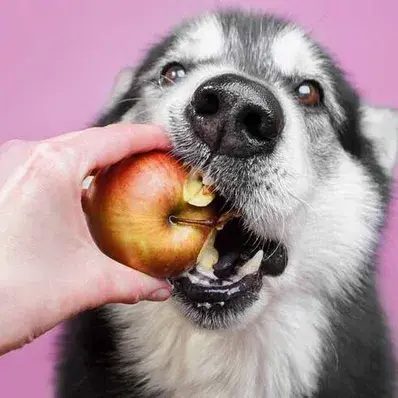How Many Apples Can Dogs Eat?
While apples are a healthy addition to your dog’s diet, it’s crucial to feed them in moderation. It’s important to consider the daily calorie intake of your dog while feeding apples. The recommended serving size depends on the size and breed of your furry friend.
For small dog breeds, start with a few small slices of apple. Avoid giving them large quantities, as their smaller digestive systems may struggle with excessive fiber, leading to stomach upset.
Larger dogs can generally enjoy slightly larger portions, but it’s essential to monitor their response to ensure they tolerate apples well. One or two slices as a treat should be sufficient for most medium to large breeds.
Can Dogs Eat Apples Everyday?
Despite their nutritional benefits, it is not recommended to give apples to your dogs daily.
Overindulgence can lead to issues related to a dog’s digestive health. The natural sugars and fiber content in apples, when consumed in excess, may cause digestive upset.
As with any new addition to your dog’s diet, observe their behavior and digestive health. If you notice any signs of discomfort, such as vomiting or diarrhea, reduce or eliminate apples from your diet and consult your veterinarian.
How Are Apples Good For Dogs?
Apples, a crunchy and flavorful fruit, can be a wholesome addition to your dog’s diet, offering various nutrition benefits that contribute to their overall well-being:
- Vitamins
Apples are a great source of vitamins, including Vitamin A, which is crucial for maintaining healthy skin and coat and supporting optimal vision.
Vitamin C, another key component, acts as a powerful antioxidant that enhances your dog’s immune system, helping to ward off illnesses and promoting overall well-being.
- Minerals
Loaded with essential minerals, apples contribute to your dog’s health in various ways.
Potassium, abundant in apples, supports proper heart function and helps maintain muscle health.
Phosphorus, another vital mineral, plays a crucial role in supporting strong and healthy bones.
- Dietary Fiber
Apples are a great source of dietary fiber, providing both soluble and insoluble fiber.
This promotes digestive health by regulating bowel movements and supporting a healthy gastrointestinal tract. Additionally, the fiber content aids in weight management, helping dogs feel full with fewer calories.
- Hydration
The high water content in apples contributes to your dog’s overall hydration. While not a substitute for water, the natural juices in apples can add a refreshing aspect to your dog’s diet, particularly beneficial for dogs who may not drink enough water.
- Low in Fat and Protein
Apples are low in both fat and protein, making them an excellent snack for dogs on weight management plans. The minimal fat content supports weight control, while the lower protein levels are suitable for dogs with specific dietary restrictions.
- Antioxidants
Apples contain antioxidants that play a crucial role in combating free radicals in your dog’s body. These antioxidants contribute to cellular health, potentially reducing the risk of chronic diseases and supporting your dog’s overall longevity and well-being.
- Dental Health
The crunchy texture of apples provides a natural way to support your dog’s teeth. Chewing on apple slices can help reduce plaque and tartar buildup, contributing to healthier teeth and gums and satisfying your dog’s chewing experience.
How to Prepare Apples for Dogs?
Making sure that apples are properly prepared is essential to maximize the benefits while minimizing potential risks for your furry friend. Here’s how to safely feed your dog apples:
- Washing and Peeling
Start by thoroughly washing the apple to remove any pesticides or residues on the skin. While the skin contains valuable nutrients, some dogs may have difficulty digesting it. Peeling the apple can be a good option, especially if your dog has a sensitive stomach.
- Slicing and Removing Seeds
After washing, slice the apple into bite-sized, dog-friendly pieces. Remove the seeds and the core, as they contain small amounts of cyanide, which is toxic to dogs. The tough apple core poses a choking hazard, so ensure it is completely removed before offering any slices to your dog.
By following these steps, you can safely share the goodness of apples with your canine companion. Keep in mind that each dog is unique, so monitor their response to apples and consult your veterinarian if you have any concerns or questions about their diet.
Preparing Apple Meals and Treats For Dogs
If you’re feeling creative, consider incorporating apples into homemade dog treats or meals.
Frozen Apple Dog Treats
For a refreshing and easy-to-make treat, consider frozen apple dog treats.
Simply mix unsweetened applesauce with dog-safe plain yogurt, add in some chopped apple pieces, and freeze the mixture in silicone molds or ice cube trays. The result is a chilly, fruity delight that your dog can enjoy on a hot day.
Apple and Peanut Butter Biscuits
Combine the goodness of apples with the irresistible taste of peanut butter by making homemade biscuits.
Mix finely chopped apples (peeled and cored) with natural peanut butter, whole wheat flour, and an egg. Cut the dough into shapes using cookie cutters, bake until golden brown, and treat your pup to these crunchy delights.
Apple and Chicken Dog Jerky
For a protein-packed snack, try making apple and chicken dog jerky.
Mix unsweetened applesauce with cooked and shredded chicken, add a touch of olive oil, and spread the mixture on a parchment-lined baking sheet. Bake at a low temperature until it turns into jerky. Once cooled, cut it into bite-sized pieces for a savory treat.
Apple and Carrot Dog Muffins
Combine apples and carrots in delicious muffins for your dog.
Grate apples (peeled and cored) and carrots, mix them with oat flour and plain yogurt and spoon the batter into greased muffin tins. After baking, you’ll have wholesome muffins that offer a blend of fruity sweetness and vegetable goodness for your canine companion.
Common Questions About Feeding Apples to Dogs
If you’re thinking about sharing apples with your furry friend, you may have a few questions about how to do it safely. Here’s a look at some frequently asked questions to help you understand the best ways to include this nutritious fruit in your dog’s diet.
Can Dogs Eat Apples With Skin?
Yes, dogs can eat apples with the skin. In fact, the skin contains additional fiber and nutrients that can be beneficial for your dog’s health. However, it’s essential to wash the apples thoroughly to remove any pesticides or residues before offering them to your pet.
Can Dogs Eat Apple Cores?
No, dogs should not eat apple cores. Apple cores contain seeds, which can be a choking hazard, and, more importantly, the seeds contain small amounts of cyanide. To ensure your dog’s safety, always remove the core and seeds before sharing apples with them.
Can Dogs Eat Apples and Peanut Butter?
Yes, dogs can enjoy apples and peanut butter as a tasty and nutritious treat. Peanut butter is a good source of protein and healthy fats, while apples add a crunchy texture and natural sweetness. Ensure the peanut butter used is free from xylitol, a sugar substitute that can be toxic to dogs.
Can Dogs Eat Apples Whole?
It’s not recommended to feed dogs whole apples. While they can physically consume them, it’s safer to slice apples into bite-sized pieces. This minimizes the risk of choking and allows you to remove the core and seeds, ensuring a safer and more enjoyable treat.
Can Dogs Eat Apple Seeds?
No, dogs should not eat apple seeds. Apple seeds contain cyanide, which is toxic to dogs in large quantities. Always remove seeds before offering apples to your dog to prevent potential harm.
Can Dogs Eat Apples and Oranges?
While dogs can eat apples, oranges should be offered in moderation. While oranges are not toxic to dogs, the citric acid may cause digestive upset in some pets. Remove seeds and offer small, peeled, and de-segmented pieces to avoid potential choking hazards.
Can Dogs Eat Blueberries and Apples?
Yes, dogs can eat blueberries and apples. Blueberries are packed with antioxidants, which are great for your dog’s health. Apples provide fiber and vitamin C, making them a healthy treat as well. Just remember to remove the seeds from apples before giving them to your dog, as they can be harmful.
Can Dogs Eat Green Apples?
Yes, dogs can eat green apples in moderation. Green apples offer the same nutritional benefits as red apples. However, be mindful of the tartness, which may not be as appealing to some dogs. As always, remove seeds and core before offering them as a treat.





